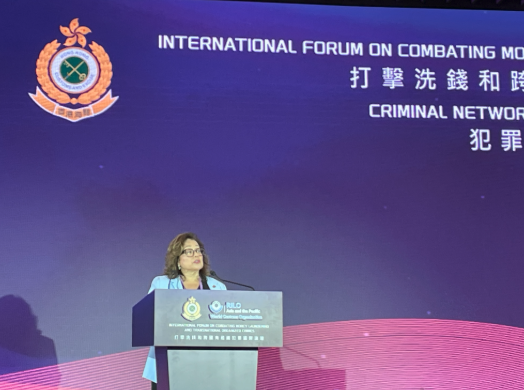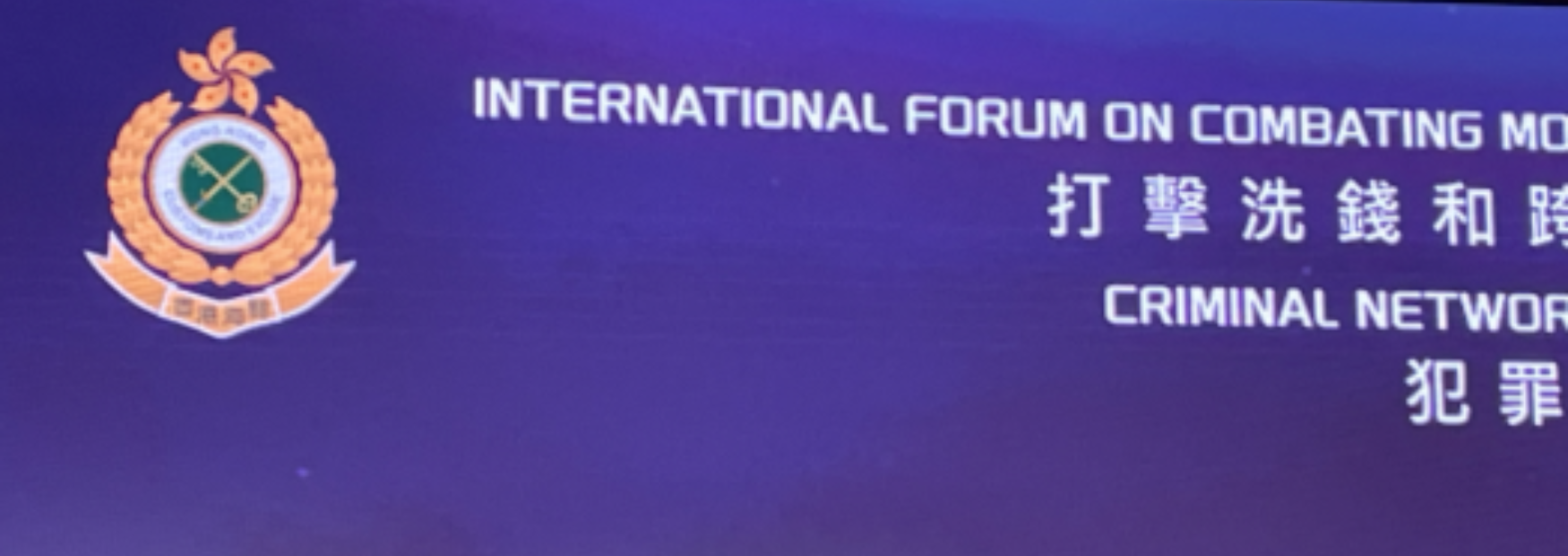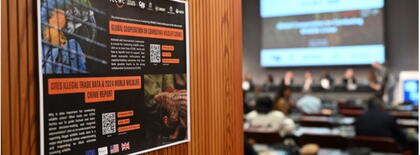International Forum on Combating Money Laundering and Transnational Organized Crimes: Criminal Networks, Trade Dynamics and Beyond
Opening Ceremony Keynote by CITES Secretary-General Ivonne Higuero
10 December 2024, Hong Kong SAR, China

Excellencies,
Distinguished delegates,
Guests and participants,
Ladies and gentlemen,
It is my great honour to address you today at the International Forum on Combating Money Laundering and Transnational Organized Crimes: Criminal Networks, Trade Dynamics and Beyond.
I would like to begin by expressing my sincere thanks to the Hong Kong Customs and Excise Department, and the Regional Intelligence Liaison Office for Asia and the Pacific of the World Customs Organization, for hosting this event and for inviting me to speak to you today.
Over the coming two days, the Forum will provide a crucial opportunity for us all to reflect on the challenges posed by transnational organized crime, and to consider how we can further enhance our collective and collaborative efforts to effectively combat it. It is certain that Customs Administrations are a critical partner in CITES’ global efforts – both at the frontlines of CITES implementation facilitating the legal trade of CITES-listed species and at the borders helping us eradicate the illegal wildlife trade.
Now about CITES…for 50 years, this legally binding treaty has been the principal international mechanism for regulating the international trade in wild animal and plant species, with the aim of ensuring their survival in the wild.
Today, CITES regulates the trade in over 40,000 species, operating through a permit system issued by the national management authorities of the Convention’s soon to be 185 Parties, working together so that trade is legal, traceable, and sustainable.
It is in this context that CITES plays a pivotal role in combating wildlife crime, as part of the broader spectrum of transnational organized crime. This type of crime not only threatens many species and undermines global conservation efforts, but also fuels corruption, destabilizes economies, and poses security risks.
Combating wildlife crime remains a global challenge. Thousands of wildlife species covered by CITES are affected by wildlife trafficking, and some of those worst affected receive little public attention such as succulent plants and fish.
The World Wildlife Crime Report 2024 showed that illegal trade took place in 162 countries and territories from 2015 to 2021.
This happens because illegal trade yields significant profits. The Financial Action Task Force (FATF) – the global anti-money laundering watchdog — estimates that environmental crime is one of the most profitable criminal enterprises, generating around 110 to 281 billion US dollars each year.
These profits are frequently channeled through financial networks intertwined with criminal enterprises. This includes money laundering and other financial crimes, as criminal networks exploit the profits from wildlife trafficking to finance other illicit activities. It is therefore imperative to investigate and disrupt the financial channels linked to wildlife crime.
Significant steps have been taken on the global stage in recent years. In 2021, the United Nations General Assembly adopted a new Resolution on ‘Tackling illicit trafficking in wildlife’ which reaffirms and builds upon other Resolutions on this topic. It places a strong emphasis on the link between wildlife crime and financial crime and calls upon Member States to further integrate financial crime investigations into wildlife crime investigations.
In 2022, the Kunming-Montreal Global Biodiversity Framework was adopted, recognised globally as an ambitious roadmap for a world living in harmony with nature, with a target to ensure that trade of wild species is legal.
And at the 19th meeting of the Conference of the Parties to CITES in Panama in that same year, CITES Parties agreed on a specific decision which further encourages financial crime investigations in the overall investigation of crimes, with the aim to identify criminals involved in wildlife crime.
Over the years, the CITES Secretariat has strengthened its engagement and collaboration with the Financial Action Task Force I mentioned earlier. It has contributed to reports and workshops on addressing illicit financial flows from environmental crime, including illegal logging.
And for over a decade, CITES has been part of a long-standing partnership with INTERPOL, the United Nations Office on Drugs and Crime, the World Bank Group and the World Customs Organization (WCO), working closely together as part of the International Consortium on Combating Wildlife Crime, or ICCWC.
In 2023, ICCWC trained over 400 law enforcement, financial and private sector professionals across the world in aspects related to anti-money laundering and addressing financial crime.
As part of ICCWC, vital resources are available to CITES Parties, such as the Customs Financial Intelligence Units Cooperation Handbook, developed by WCO, which promotes cooperation between Financial Intelligence Units and customs services to effectively disrupt cross-border money laundering and terrorism financing activities.
ICCWC also supports the Customs Administrations of CITES Parties involved in international wildlife crime operations. Customs Administrations deserve our highest admiration for their commitment to wildlife conservation. I have witnessed the increasing recognition by Customs Administrations that wildlife crime is a grave threat to human well-being and our planet.
Last year’s joint global law enforcement operation led by the WCO and INTERPOL, Operation Thunder 2023, resulted in over 2,000 seizures and 500 arrests. Operation Mekong Dragon, a joint Customs-led operation in the Asia-Pacific region, yielded the record-breaking interception of 1,715 cases of CITES-listed species. As part of this operation, Hong Kong Customs seized a notable 12 tons of shark parts and products, thanks to the coordinated enforcement work.
My sincere congratulations to Hong Kong Customs and to all CITES Parties involved for this achievement!
Ladies and gentlemen,
It is clear that there has been much progress over the years yet there is still much more to do in our fight against wildlife crime and the illicit financial flows associated with it. We must prioritise wildlife crime alongside other transnational organised crimes.
Strengthening measures to address illicit financial flows from wildlife crime will help ensure that the criminals involved do not benefit from the proceeds of their crimes. This will make wildlife trafficking a high risk and low reward activity.
Thank you all for your commitment and dedication to the important work you do every day.
I look forward to the presentations, discussions and connections made at this Forum which will undoubtedly contribute to our shared mission of tackling transnational crimes of all kinds.
Thank you.



